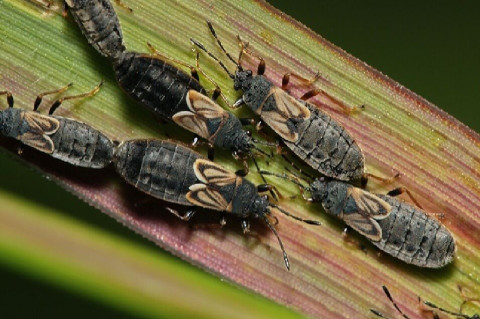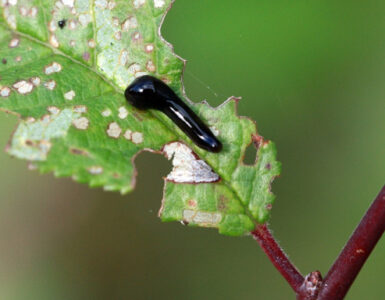Do you have a pesky chinch bug problem in your yard? Well, you’re not alone.
These little critters can be tough to get rid of, but there are some natural ways to control them.
In this article, we will highlight how to get rid of chinch bugs using organic methods.
Identification
If you’re seeing small black bugs on your grass, there’s a good chance you’re dealing with chinch bugs. But how can you be sure?
Well, the easiest way to tell is to take a close look at them. If they have white triangular marks on their backs, then most likely you’re dealing with these critters.
Another thing to look for is damage to your grass, which will appear as dead patches.
Chinch bugs are tiny, black bugs with white wings that live above the soil.
They love to feed on lawn grasses [1], and when they do, they can cause significant damage. This is why they’re such a big problem for homeowners.
They will also feed on corn, wheat, barley, and turfgrasses such as Kentucky bluegrass, Zoysia grass, fescues, and Bermuda grass.
The good news is that there are a few ways to get rid of them organically.
How to Get Rid of Chinch Bugs Naturally
If you’re seeing a lot of these pests in your yard, there are a few things you can do to eliminate them.
One is to use a pesticide, but I’m not a fan of using harsh chemicals, so I choose eco-friendly ones like those highlighted below. There are also some other natural ways to control chinch bugs, which I’ll discuss below.
1. Don’t Over Water or Under Water the Lawn
The first thing you want to do is make sure you’re watering your lawn correctly. Don’t overwater it, but don’t underwater it either.
These lawn pests thrive in hot, dry conditions, so keeping the soil too dry will make it easier for the eggs and nymphs to survive. In contrast, overwatering can lead to thatch accumulation on lawns.
2. Avoid Over-Fertilizing
An over-fertilized lawn is very appealing to these bugs because it contributes to thatch and weeds.
So if you’re trying to control chinch bugs in your lawn, the first thing you need to do is cut back on the fertilizing.
3. Beneficial Insects
What are beneficial insects, you ask? They are insects that eat other insects.
So, by releasing these insects into your garden, you’re doing yourself a favor because they’ll get to work eating all of the destructive insects and related pests.
You can use beneficial insects, but my personal favorite is ladybugs. They’re cute, and they’re effective in dealing with these and other bad bugs.
Big-eyed bugs and lacewings are other insects that eat chinch bugs.
4. Diatomaceous Earth
This powder works well against chinch bugs. It punctures their exoskeletons, leading to dehydration and death.
To use it, sprinkle some organic DE on your lawn and let it sit for a few days. The diatomaceous earth will kill the bugs already there and repel others from coming near. Easy peasy!
5. Insecticidal Soap
Insecticidal soap is a product that you can acquire at most hardware stores or online, and it is effective at killing chinch bugs. All you need to do is thoroughly spray it on the affected areas.
The best thing about this treatment is that it’s non-toxic and won’t harm your plants. It’s an excellent option for people who are seeking natural chinch bug treatments.
You can also make a DIY insecticidal soap by mixing two tablespoons of Dawn dish soap (organic liquid soap is even better) with a gallon of water. Apply to target areas.
6. Natural Predators
Apart from the natural enemies listed above, bring in some other natural predators.
Ground beetles, earwigs, ants, and some wasps are other natural enemies of the chinch bug. Some birds also eat these pests, including false chinch bugs.
Try to attract these predators to your yard.
7. Vinegar
Vinegar helps kill all kinds of insect pests, and chinch bugs are no exception.
Some gardeners suggest mixing one part vinegar with ten parts water and spraying it only on infested areas of your lawn.
The solution will kill chinch bugs.
8. Arber Bio Insecticide
You can also consider using a chinch bug insecticide like Arber. It is effective against a wide range of pests, including aphids, armyworms, stink bugs, and whiteflies.
Moreover, it’s non-toxic, so you can use it in your garden or on your plants without worrying about any adverse effects.
9. Debug Turbo
Debug Turbo is another natural product that is safe to use and has been proven effective against chinch bugs.
This insecticide is a liquid concentrate that you mix with water and spray on affected areas. Its active ingredients include neem oil.
It’s non-toxic and biodegradable, and it won’t harm the environment or your plants. If you really want to use pesticides but avoid the harmful ones, this is a great choice.
10. Bug Buster-O
Bug Buster-O is another natural pesticide that can help. It’s made with organic pyrethrins, which work to kill the chinch bugs.
However, it is toxic to bees, so use it with care to avoid harming them. You can safely use it on vegetables, flowers, ornamentals, and just about any plant.
11. Dethatch Your Lawn Annually
To effectively deal with the situation, dethatch your lawn regularly. This will keep it healthy and remove the protective environment that these lawn bugs love.
Takeaway
Chinch bugs can be a real nuisance, especially if you’re trying to garden or keep your lawn healthy. These little pests can quickly do a lot of damage. But don’t worry; we’ve got you covered.
The methods we discussed here are safe for your plants and family, and they’re sure to kill or help deter chinch bugs without harming pets or plants.








Add comment